Learn the Guitar as a Busy Adult: 22 Practical Tips
Preface
I started playing the guitar when I was 33 years old to fulfill a lifelong dream. The journey started when I walked into Guitar Center and bought a $150 Yamaha acoustic guitar – along with a lesson book.
Then, the guitar sat in my closet for two years.
The problem was that the lesson book I bought wasn’t engaging. It was teaching me how to play ‘Hot Cross Buns’ and ‘Mary Had a Little Lamb’ by sight rather than teaching me the tools I really needed to learn the guitar. I got bored and lost interest, and the guitar sat in my closet – out of sight and out of mind.
The turning point came when I moved out of my condo and sold a bunch of my stuff. As I posted my belongings on Craigslist, I came across my guitar and had a decision to make – do I sell the guitar or keep it?
I took a picture of the guitar to put it up for sale, but before I posted it, I remembered a conversation I had with one of my best friends months before. He is a guitar player. He liked my guitar and asked me to tell him if I ever wanted to sell it. I promised him I would.
When I picked up the phone to call him, I couldn’t do it. Something in me wouldn’t let me make the call. It felt like I was losing something important – something sacred – even though the guitar had been sitting in my closet nearly untouched since I got it. It felt like selling my guitar was giving up on my dreams, and giving up on my dreams is not acceptable to me – so I kept the guitar.
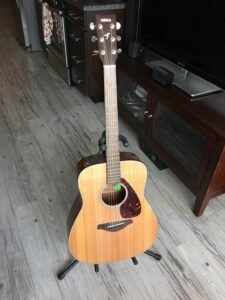
This is the exact photo I took of my guitar when I almost sold it on Craigslist. Good thing I didn’t.
When I moved into my new apartment, I decided to hang the guitar on the wall in my room – where I would see it all the time. The trick worked and renewed my motivation to learn. If I was going to have a guitar on my wall, I had to know how to play it. I could not be a poser.
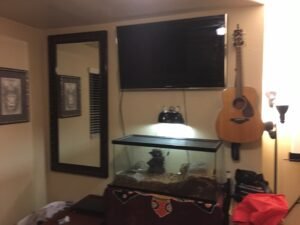
My guitar on the wall in my apartment in North Park. Placing the guitar out, in front of me, and ready to play encouraged me to play it.
Instead of going back to the boring lesson book I had before, I consulted Google and typed in something like, ‘’how to learn the guitar.’’ That’s when I found JustinGuitar, which was a complete life-changer.
Justin taught the guitar in a way that was fun and accessible, and I started learning quickly. With just a few basic chords and strumming patterns under my belt, I could already play a wide variety of songs. Justin’s system was perfect for me. I bought his beginner book and intermediate book and devoured them. If he ever releases an advanced book, I will devour that too.
Thanks to Justin and consistent daily practice, I learned the chords, scales, picking techniques, strumming patterns, and other tools I needed to become a guitar player. Since then, I have learned from many different books and videos, but I still refer to Justin‘s materials regularly. Whenever there is something I want to learn about the guitar, the first thing I do is see if Justin has shared anything about it. If he has, it’s gold – and in most cases, he has.
My 2018 New Year’s Resolution was to play the guitar every day. I kept the resolution, and I’ve now been playing the guitar for over seven years. I also learned how to sing and play the bongo along the way.
I may not be Stevie Ray Vaughn yet, but I am light years ahead of where I started. I can play guitar and sing at the same time. I can write and record original music. I am well on my way to being the musician I always wanted to be.
I’ve learned many valuable lessons so far on my journey. These are my 22 biggest takeaways.
Tip #1: Pick up the guitar every day, even if it’s only for 5 minutes.
I credit this rule with half of my success because half the battle is just picking up the guitar. As soon as I pick up the guitar, I inevitably start having fun and end up playing much longer than 5 minutes.
I intentionally set the threshold low for a few reasons. First, you can always make 5 minutes in your day to pick up the guitar – no matter how busy you are. This eliminates the excuse of, ‘’I just didn’t have time today.’’ Yes, you did. You can always pick up the guitar for 5 minutes, even if it’s the last thing you do before bed. For me, playing the guitar is often the last thing I do before bed – even if I already played that day.
Second, setting a high threshold can become burdensome. If you tell yourself you’re going to play for an hour or two every day, that is difficult for most busy adults to manage. It can be easy to get off track and even start dreading the guitar because of the burden of practicing.
Make the guitar your friend, not your taskmaster. Make your goals achievable and exceed them rather than the other way around. It will help your morale and keep you engaged with the instrument.
Third, 5 minutes is enough to learn something. There have been times when I’ve picked up the guitar, monkeyed around for 5 minutes, and discovered something new. 5 minutes is enough time to have a breakthrough in your learning. Do not underestimate the power of picking up your guitar for 5 minutes.
If you can play for 20 minutes, or an hour, or more every day, then do it. Play as much as you can. But pick the guitar up every day for at least 5 minutes.
Why play every day?
There is something magic about playing the guitar every day – or doing anything every day. It becomes a part of who you are. Your self-belief increases. When you do something every day for an extended period of time, it starts to feel second nature. That’s the goal – you want playing the guitar to feel second nature. So, do it every day if you really want to learn.
Tip #2: It’s never a bad time to play the guitar.
Obviously, there are exceptions to this. I don’t suggest picking up the guitar while driving a car, for example. But you get my point: pick up the guitar and play – anytime, anywhere.
Time spent on the guitar is never wasted – whether you play for five minutes or five hours.
Lesson #1 and Lesson #2 ultimately boil down to one golden rule: pick up your guitar and play.
Tip #3: Find a book or course that works for you.
If you start with a particular book or course and don’t like it, move on to a different one. Don’t let yourself get bored. You have the absolute right to enjoy what you are learning and playing.
Find tools that meet you at your level. Tools that are too advanced may confuse or discourage you. Tools that are too easy may be boring.
Also, find tools that teach what you want to learn. Studying material that doesn’t interest you may lead to boredom. Focus on learning the things you want to learn. If you’re not excited about what you’re learning, move on to something else so you don’t get stuck. Learning should be fun and exciting.
If you’re not sure where to start, then start with JustinGuitar. That’s where I started, and it changed my life.
Tip #4: If you get tired of practicing, it’s time to learn something new.
Chances are you’re not sick of practicing – you’re sick of practicing the same old stuff. Learn something new, and practice will become fun again. Boredom is a sign that it’s time to learn new stuff – not a sign that you should stop playing the guitar.
You should never stop playing the guitar. Guitar is for life. Learning new material will keep you excited and motivated to keep going.
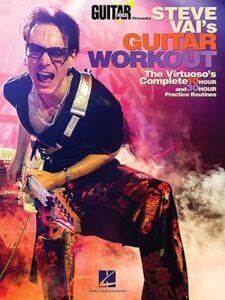
Steve Vai’s 10-Hour Guitar Workout is a great book for any developing guitar player.
Tip #5: Learn a few songs right away.
Learning songs gives you something to show for your work. You would be amazed at the number of songs you can play with three chords (E, A, and D for example).
Get a beginner songbook that has some of your favorite songs, or find tutorials on YouTube. If you love a song, chances are that some genius has made a great tutorial for how to play it on YouTube – so take advantage.
It’s worth noting that there are easy versions of songs and harder versions. If the recorded version of a song is too difficult to play, there’s probably an easy campfire version that simplifies it.
Easy, campfire songs are fun to play and will keep you motivated to learn more songs. Plus, they give you something to play when someone asks if you play the guitar.
Get a few easy songs in your repertoire from the beginning.
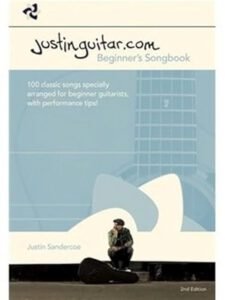
Justin Guitar Beginner Songbook. Getting a beginner songbook like this is a good idea when starting out.
Tip #6: Start writing songs now.
If you know two chords, then you know enough to write a song. I learned this from Tom Morello – the guitarist for Rage Against the Machine.
When Tom was an up-and-coming guitarist, he gave guitar lessons. With each student, their first class was to learn two chords and write a song. Then, their homework was to write another song.
This teaching technique is genius. There is magic in realizing you only need two chords to write a song. By the end of their first lesson, Tom‘s students were songwriters. The veil was lifted.
If you have written a song, then you are a songwriter. You, the Beatles, and Bob Dylan – all songwriters. The phony idea that you have to be a musical genius to write a meaningful song was blown to smithereens – on Day 1.
The reality is that there is no Wizard of Oz. Writing a song on Day 1 lifts the cloak and removes all the mystery from it. You don’t need advanced techniques to write a song. You, too, are a songwriter – from the very beginning.
Tom was the best teacher that any beginner musician could have because he destroyed the illusion that you need advanced technique to write a song.
Take this lesson and apply it to yourself. Start writing songs now. Write one today.
If you know two chords, then you know enough to write a song. You can learn two chords in your first session. Do it, and write a song.
Writing a song – one song – is the single most powerful exercise that you can do as a musician because it eliminates the most powerful illusion of all: the illusion that you can’t do it.
Once you realize that you can, all the doors open up for you.
You don’t need decades of experience on the guitar to write a meaningful song. You only need two chords and something to say.
To me, writing music is a process of self-discovery – and it’s an essential part of the musical journey. All of my favorite musicians are great songwriters.
You don’t have to be a genius to write a song. You only need two chords and something to say.
I challenged myself to write and record an original song by the end of the day. This is the result.
Tip #7: Record yourself.
Recording yourself is probably the most powerful teaching tool you have. Recording yourself gives you feedback. By listening to yourself on record, you will notice things that you didn’t before. Recording allows you to watch and listen to yourself objectively, through a lens other than your own.
The feedback that you get from recording may be brutal – especially when you are just starting out – but it’s very informative. You can learn a lot from it.
Recording yourself is also a measuring stick. If you feel like you aren’t making any progress, you can go back and watch your old recordings to see how far you’ve come. Chances are, you will be blown away at how much progress you’ve made. Seeing how much progress you’ve made is highly motivating.
Once you get good, going back and listening to yourself as a complete beginner can be gratifying – it shows you how far you have come.
Me playing Hotel California by The Eagles.
Tip #8: Listen to the people who you want to play like.
One of the best pieces of writing advice I ever got was to read the writing of people who you want to write like. Your all-time favorites. The real, timeless geniuses. Get their words flowing through your head, and it will show up in your writing.
Well, the same works in music. Listen to your favorite guitarists and pay attention to what they are doing. Watch videos of them and pay attention to how they play. Get their sounds and patterns and licks in your head, and watch them show up in your playing.
Part of being a great guitarist is learning from great guitarists. Every great guitarist has other guitarists who they love and who had a major impact on their style. Find your mentors and study them. Listen to their whole album, then listen to it again. You will start to see patterns. Those patterns are the way.
Tip #9: When inspiration strikes, hit record immediately.
Inspiration is fleeting. It comes and goes. Some days, you might labor to create something interesting. Other days, inspiration hits you like a lightning bolt. You pick up the guitar, and magic happens. You start playing and fiddling around, and – holy shit – that sounds great!
When you have one of those ”holy shit” moments, hit record immediately. Don’t wait. Don’t say, ”Oh, I’ll come back to it later.” You might forget. Those moments of genius can come and go incredibly quickly. You can’t always remember the great idea you had yesterday. Record it now while it’s fresh in your mind. That way, you can revisit it later.
Anytime you have a good idea, record it right away. Keep all of your recordings in one place – where they won’t get lost – so you can go back and revisit them. You can later develop that material, combine it, and make it into songs.
Tip #10: When you find yourself doing something cool, make a drill out of it.
I learned this one from Steve Vai. In addition to recording your great ideas, also make a drill out of them – this allows you to repeat and refine them.
For example, if you play a particular pattern that sounds great, try playing it on different parts of the guitar neck – or on different strings. Making a drill out of it reinforces the pattern, helps you remember it, and ingrains it into your repertoire so that it will show up while you are improvising.
Repeating your ideas burns them into your musical memory so that they come out while you are playing, without you having to think about it. That’s what you want. Less thinking, more feeling.
Tip #11: The more you think, the more you stink.
Yes, it sounds funny, but don’t discount this idea. It might be the most important one on the list.
The less you think while you are playing, the better you will play. It’s like meditation. In meditation, the object is to get to the space between your thoughts – where you are thinking about nothing.
This is the same headspace you want to enter while playing the guitar – thinking about nothing – just being completely present.
Now, there is a distinction between practicing and playing. Practicing often involves a lot of heavy brain work and thinking. It involves attention to detail and being intentional about what you’re doing.
For example, when learning new chords, scales, or techniques, you will likely have to think about what you are doing until you get them to the point where they are automatic. Thinking is fine – when you are practicing.
When you are playing – playing songs or improvising – you want to think as little as possible. You want to be automated. You want to be ‘’in the zone’’ – completely focused. Thoughts will inevitably pop into your mind while you are playing. Let them go, and immediately re-focus your attention. Don’t judge yourself, and don’t judge your thoughts.
If you make a mistake, immediately forget about it and keep going. Dwelling on it compounds the problem and increases the likelihood of another mistake. Let it go, and keep playing like it never happened.
The worst thing you can do if you make a mistake is stop playing. Keep your strumming/picking hand moving as though the error never occurred (this will be your right hand – unless you’re a lefty).
Tip #12: Don’t compare yourself to others.
I learned this lesson from Laird Hamilton. Laird was talking about surfing, but the lesson applies equally to music – maybe even more so.
Comparison is the thief of joy – and it can also stunt your growth. I know it’s hard not to compare yourself to others. It’s a natural tendency. But don’t do that to yourself.
There will always be someone who’s light years ahead of you. You can go on YouTube right now and find a 10-year-old prodigy who absolutely shreds. Don’t compare where you’re at in your journey to where other people are in theirs.
Yes, some musicians were born with prodigious talent. Others have to work for it. But no matter how humble your beginnings, you can become a great musician.
For example, Christina Aguilera has been belting since she was a kid. Sia, on the other hand, said she worked for 20+ years to develop her skills. Two extraordinary musicians – two different paths.
Focus on being better than you were yesterday, and don’t compare yourself to others.
Tip #13: Don’t judge yourself too harshly.
This lesson is similar to the last one, but it bears repeating. Self-judgment is probably the single biggest killer of joy and creativity when it comes to making music.
It’s okay to make mistakes. Your favorite musician has missed notes and screwed up songs. It’s part of the deal. Just keep going.
Learning to play music is similar to learning a language. You don’t learn it all at once. You learn it piece by piece – and it’s a never-ending learning process.
If you play the guitar long enough, you might have good days and bad days. Sometimes, you might feel like you can’t do anything right. That’s fine. It’s part of the deal. Just keep going.
Which brings us to our next lesson…
Tip #14: The only thing that’s not okay is to quit.
Like many things in life, the guitar becomes more fun the better you get at it. The longer you keep going, the more sounds, techniques, and skills become available to you. You will have more opportunities to perform in front of people, and play with other musicians.
You may struggle. You may get off track. You may cry. All of that is acceptable. The only thing that is not acceptable is to give up. Keep playing your guitar.
Tip #15: Start playing in front of people now.
If you want to be a musician, you have to play in front of people. Start now. Play for your wife and kids. Play for your family on holidays. Go to open mics and talent shows. Play in cafés or bars. Busk in the street. Put out a tip jar.
Do whatever you have to do to get in front of people. It will help you conquer the fear, and it’s highly rewarding. Playing in front of people motivates you to keep playing.
Having talked to musicians who’ve played live shows for decades, I don’t know if the fear and anxiety of playing in front of people ever goes away. Even James Hetfield, the lead singer of Metallica for the past 40+ years, talks about having nightmares and anxiety about going on stage. It happens to even the most experienced and accomplished musicians.
But you learn how to harness the energy and channel it into your performance. You face the fear to get the natural high of performing in front of people, and it’s totally worth it. There is a reason your favorite musicians keep going up on stage, even though it takes so much to get up there.
With experience, you learn how to manage and channel the fear better. And you learn to love the joy that’s on the other side of it.

One of my first times playing live. My friends and I organized a talent show at Café Bean.

A flyer from one of our talent shows.

Another talent show flyer.
Tip #16: Play with other musicians – especially people better than you.
Playing with other musicians is one of the best ways to grow as a musician. Other musicians will teach you new things and make you recognize new things about your playing that you didn’t realize before.
Playing with other musicians forces you to learn how to play in time, work through mistakes, and pay attention to how you sound in relation to other people.
If your ultimate goal is to play in a band, then play with other musicians as much as you can – especially people who are better and more experienced than you. Other musicians can be great guides and mentors.

I got the opportunity to play live with my friend Gabriel, who is a great musician. I learned a lot from him.
Tip #17: Follow your curiosity.
If you’re wondering what to learn next, follow your curiosity. If you’re curious about the blues, then learn blues techniques. If you’re curious about fingerstyle, then learn fingerstyle techniques. If you’re curious about bluegrass, then focus on bluegrass.
Your curiosity is your roadmap. If you notice someone playing something you like, look up how to do it. If you can, ask them directly.
There are a million different roads you can take with the guitar, and sometimes it can be overwhelming. Just keep learning the things you are most curious about, and you will be fine.
Tip #18: Have your guitar out and be ready to be played at all times.
The fewer barriers there are between you and playing your guitar, the better. Hang your guitar on the wall or put it on a stand in a place where you will see it all the time. The more visible it is, the harder it is to ignore and the more inviting it is to play. That’s what you want.
If you keep your guitar in a case in the closet – it is out of sight and out of mind. Not to mention, you have to go through the trouble of taking it out of the closet and out of the case to play it. This creates extra steps and extra work – which you don’t want. Make it as easy as possible to pick up your guitar. Have it ready at all times.
If your guitar is electric, keep it plugged in. The number of steps between you and playing your guitar should be zero.
Have the guitar ready to play at any moment – so don’t lose time having to set up.
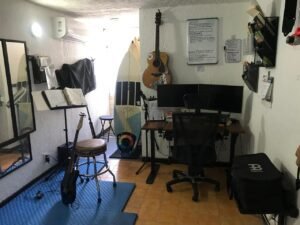
My workspace. Guitars ready.
Tip #19: Get the right equipment.
Playing the guitar doesn’t have to be expensive. I highly recommend Yamahas for entry-level guitars, both acoustic and electric. They are excellent quality for the price – you won’t get better bang for your buck.
In terms of the amount of fun I’ve had for the amount of money I spent, my $150 Yamaha acoustic was the best investment I have ever made. Hundreds, maybe even thousands of hours of fun for $150? Can’t beat it.
Rather than throw $150 over the bar, you can get an entry-level guitar and have some real fun.
If money is not an issue and you want to buy a more expensive guitar right off the bat, go for it. The important thing is to buy something you like and that you will actually play. If you always dreamed of playing a Les Paul, and you can afford to buy one, then do it.
Do whatever will get you motivated to play. Buying new gear can be a great rut-buster if you ever feel like you lack motivation.
When buying an acoustic guitar, there are two key features I recommend. First, I suggest a guitar with a neck cutaway that allows access to the higher frets on the fretboard (see photo below).
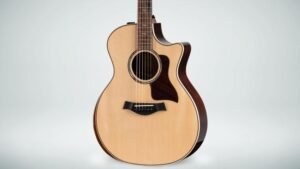
Taylor Grand Auditorium Guitar with neck cutaway. [Photo Credit: Taylor Guitars]
Without the cutaway, it can be difficult to play beyond the 12th fret. Having the cutaway gives you more freedom and a wider variety of sounds. When I bought my first guitar, I did not realize this. I bought a guitar without the cutaway, and regretted it.
The second feature is a strap peg at the base of the neck. If your guitar does not have a strap peg, then you will have to connect the strap to the headstock of the guitar (see photo below).
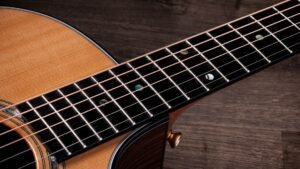
Taylor Legacy 714ce guitar with peg for shoulder strap. [Photo Credit: Taylor Guitars]
Connecting the strap to the headstock is fine, but I find it annoying because the strap gets in the way of my fretting hand sometimes.
Also, having the strap at the base of the neck – instead of the headstock – is a more comfortable playing position for me. This may be a matter of personal taste, but I still recommend buying a guitar that comes with the peg. You will still have the option of connecting the strap to the headstock, if you prefer.
If you buy a guitar without the peg and later decide that you want it, you will have to install it yourself (like I did).
Tip #20: Keep a guitar notebook.
Write down everything you learn about the guitar and keep it in a notebook that is dedicated specifically to the guitar. You will thank yourself later.
Writing things down helps you remember them and also gives you reference material that you can revisit later. If you learn a song, write down the words, chords, and riffs. If you learn new techniques, write them down. If you watch a lesson on video, write down the key takeaways.
If you do this for long enough, you will have a treasure trove of guitar knowledge. My guitar notebook is one of the most valuable things I own. If God forbid, my house was burning down – my guitar notebook is one of the first things I would grab because it would be difficult or possible to recreate. I would have to spend hundreds of hours or more to recreate the information in that notebook.
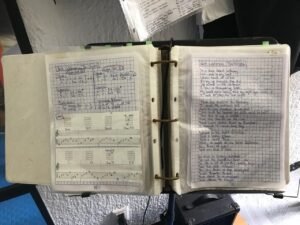
My guitar notebook is a 3-ring binder with sections for chords, scales, exercises, songs, and other materials. I use plastic page covers to preserve the pages, and for organizational purposes.
Tip #21: Never stop learning.
It doesn’t matter how good you are at guitar; there is always something new you can learn. If you’ve mastered rock and blues, then try country. Then, fingerstyle. Then, Spanish guitar. There is always something new to learn.
Steve Vai famously sought out Joe Satriani as a teacher in his never-ending quest to get better at the guitar (as did Metallica’s Kirk Hammett). The best players never stop looking for ways to get better, no matter how good they are.
Many times, the best way to improve is to find the right teacher. This brings us to the final lesson…
Tip #22: Hire a teacher.
I put this one last because not everyone has access to a teacher. For some, hiring a teacher is prohibitively expensive. For others, there aren’t any teachers where they live.
You do not need a teacher to learn the guitar. There are enough written and online tools that you can get along just fine without one. However, hiring a good teacher can greatly accelerate your learning. It may be the single best thing you do for your guitar playing.
A good teacher will know where you are (Point A), where you’re trying to get (Point B), and all the steps you need to take to get from Point A to Point B.
Your teacher should be able to meet you at your level and know exactly what you need to do to get to the next level. That information is invaluable – it can save you a lot of trial and error.
Your teacher should be able to do what you want to do. If they can’t play the parts that you want to play, they probably shouldn’t teach them.
Not every teacher is the right teacher. Dave Grohl of Nirvana and the Foo Fighters shared a story about how he once hired a guitar teacher. Dave was already a good guitar player when he hired the teacher. Instead of teaching Dave something new, the teacher tried to teach Dave how to hold the guitar pick correctly. Not surprisingly, Dave lost interest and never visited that teacher again.
If you don’t ‘’click’’ with a particular teacher, then seek out a different one. There’s no point in wasting time or money if it’s not the right fit. However, if you can find a teacher that is the right fit, it will add rocket fuel to your learning.
Visit my music page.
More stories by Eddie.
More essays by Eddie.
Visit my YouTube channel for surfing, skating, and music videos.

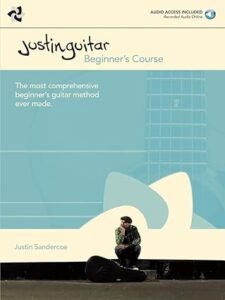
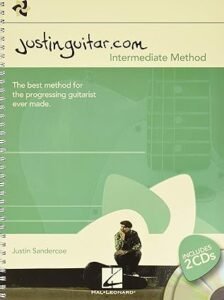

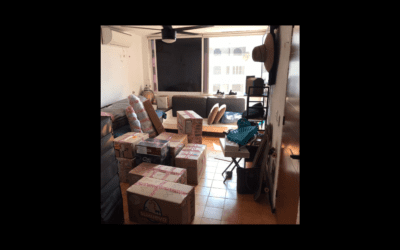
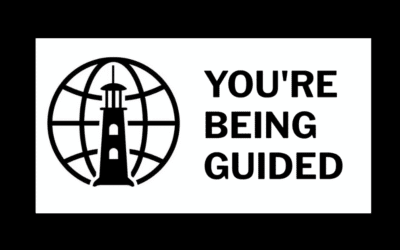
0 Comments